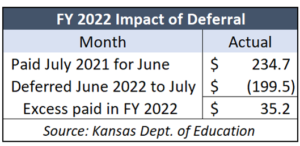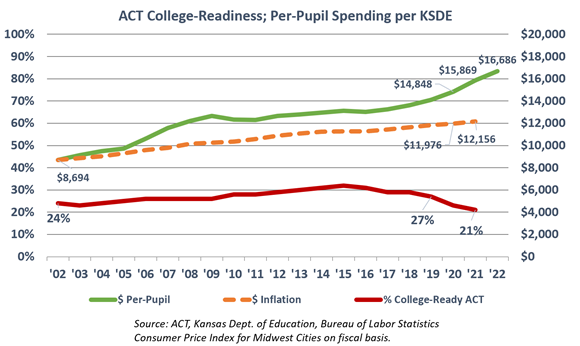[vc_row][vc_column][vc_column_text]Gov. Laura Kelly’s budget proposal to gift $200 million to schools this year – on top of a court-mandated $243 million increase – isn’t needed for several reasons. It’s just an election year stunt to paint opponents as being unwilling to ‘fully fund’ public education.
Under Gov. Kathleen Sebelius, the Legislature deferred about half of the June 2003 school distribution to July in order to balance the 2003 budget. Schools weren’t harmed by the deferral because they had large cash reserves. The practice has continued since 2003 because ending it would increase that year’s budget.
In keeping with past practice, this year’s budget defers $200 million in school funding to July, but that doesn’t mean schools are getting $200 million less than they should. The catch-up payment for June 2021 that was made in July 2021 – and isn’t part of this year’s funding – must be taken into account.
 The Dept. of Education doesn’t have 2003 data readily available, but Deputy Commissioner of Finance Craig Neuenswander says the following analysis is an accurate representation. For simplicity, it assumes school funding was $1,000 per month in FY 2002 and increased by 3% in FY 2003.
The Dept. of Education doesn’t have 2003 data readily available, but Deputy Commissioner of Finance Craig Neuenswander says the following analysis is an accurate representation. For simplicity, it assumes school funding was $1,000 per month in FY 2002 and increased by 3% in FY 2003.
School funding would have been shorted by $450 in June and paid the next month. Schools also would have received $1,030 that month for the new year, and each month thereafter through May of 2004. Neuenswander says schools would have received $500 of the June payment, putting total funding at $12,280 for FY 2004 versus the $12,360 they should have received. That makes the shortfall just $80, not $530 that was deferred.
The alleged shortfall isn’t the amount deferred to July; it’s just the difference between that and the money received in July 2021 that was  deferred from June 2021. And here’s something else Gov. Kelly failed to disclose – schools have a windfall this year, not a shortfall.
deferred from June 2021. And here’s something else Gov. Kelly failed to disclose – schools have a windfall this year, not a shortfall.
Neuenswander says $235 million was deferred from June 2021 to July, so with just $200 million being deferred this year, public schools are collecting $35 million more this year than they are supposed to receive – yet Gov. Kelly wants to give them an additional $200 million gift. She frames it as getting funding on the “right” schedule, but it seems more like an opportunity to pick an election-year fight on the “fully funding schools” line she repeatedly used during the State of the State.
But even if there was a shortfall this year, schools don’t need the money because they have close to $1 billion of unspent aid from prior years.
Cash reserves balloon to $1 billion
Schools have four categories of cash reserves – federal, capital outlay, debt, and operating. Federal reserves are excluded from this analysis as the totals are too small in most years to show on the chart below.
Cash reserve data goes back to 2005 and shows schools collectively had $468 million in operating cash reserves and reserves increased to $991 million on June 30, 2021. Most of the $523 million increase represents state and local funding that wasn’t used. (Reserve balances are determined on a cash basis like a checking account; the year-end balance increases when more money is deposited than spent.)

School officials collected hundreds of millions more than they needed in prior years, so they certainly don’t need legislators to gift them with any more taxpayer money.
The purpose of education is academics, not money
Governor Kelly and education officials like the focus to be on money because they don’t want parents and legislators to evaluate the real purpose of education – the extent to which students are being academically prepared for college and career.
According to the Kansas Department of Education’s 2021 state assessment results, there are more high school students below grade level than are on track for college and career. And it shows in the ACT results.
Only 21% of Kansas graduates are considered college-ready in English, Reading, Math, and Science. School spending continues to grow faster than long-term inflation but achievement is low and declining. A bit of the decline can be attributed to more students taking the test, but that just means that prior years’ results were artificially high. Indeed, KSDE recently told legislators to expect college readiness to further decline as more students take the ACT test.

Taxpayers have been more than generous with the public education bureaucracy. Adjusted for the cost of living, Kansas spending per pupil was the 13th highest in the nation in 2019. Many states that spend less than Kansas have higher achievement levels.
Legislators should reject Gov. Kelly’s proposed $200 million gift to education officials, and they should hold them accountable to improve achievement.[/vc_column_text][/vc_column][/vc_row]




